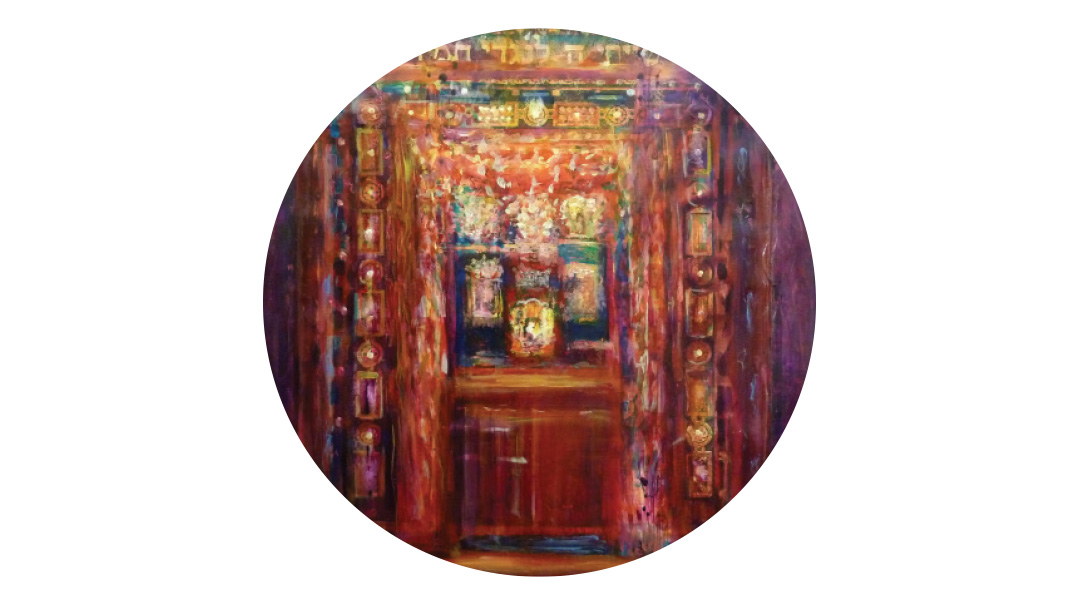Right Side, Left Side


The choices we make every day define us
I was a young adult when a dentist took X-rays to locate my wisdom teeth. “That’s interesting,” he remarked. “You only have wisdom teeth on the right side of your mouth. There’s nothing on the left.”
Wanting to be sure I understood, I pressed him. “Do you mean they haven’t appeared on the left side, or they don’t exist at all?”
His response was a one-liner that would never come out of the mouth of a maamin, a believer in Hashem and His power. “I mean,” he said with a smile, “That when G-d gave out wisdom teeth, you were at the end of the line.”
Years later, I sat with a frustrated, resentful student, who gave me all sorts of explanations for her poor performance and poor behavior. “If only,” she began. “If only I were smarter, had more talents, weren’t an only child….”
I held up my hand to stop her ruminations and told her about my conversation in the dental office. “The dentist was wrong,” I said. “There’s no such thing as being ‘at the end of the line.’ Hashem makes no mistakes, and you weren’t overlooked when He handed out brains, talents, and family members. He gives each person the life package designed especially for him. Our job is to do the best we can with the gifts and circumstances He gives us.”
Heaven’s Gifts
Even a coveted gift may prove to be a liability if the recipient doesn’t handle it well. The Midrash in parshas Matos discusses this scenario, listing three gifts — wisdom, strength, and wealth — that allow someone who merits even one of them to acquire the “best” in both This World and the Next.
“When is this so?” the Midrash asks. “Only when these gifts originate from Heaven and from the power of the Torah [i.e., when he wants to use them for Torah, Hashem will grant them freely and easily]. But when these gifts do not originate from HaKadosh Baruch Hu [i.e., they are not used to serve Hashem], they will ultimately cease.”
The objective of Heavenly gifts is for the recipient to use them to serve Hashem. However, if one uses them for his own personal gratification, they’re no longer considered gifts from Heaven, and they become worthless and impermanent.
The Midrash continues to list examples of people who squandered, misused, and ultimately lost their gifts. One case is Shevet Reuven and Shevet Gad, who were wealthy livestock owners in the generation of the Midbar. As Klal Yisrael neared Eretz Yisrael at the end of their 40-year journey, these Shevatim approached Moshe with a startling proposal. They asked to take their portion of the Land in eiver haYardein, the newly captured eastern bank of the Jordan River, which has less sanctity than the western side. The Chumash describes in detail the deal they struck with Moshe Rabbeinu in order to achieve this goal.
They frame their request in pragmatic fashion: “The land is good for cattle and we, your servants, have much cattle” (Bamidbar 32:4).
The Midrash notes that because Reuven and Gad treasured their money and chose portions outside of Eretz Yisrael’s proper boundaries, they ultimately lost out, for they were exiled earlier than the other Shevatim.
A Portion in the Land
What possessed these Shevatim to abandon their long-awaited, much-anticipated goal of entering Eretz Yisrael? How could they, members of the Dor Dei’ah, the exalted generation that maintained a constant focus on Hashem, have chosen material possessions at the expense of living outside the Promised Land?
Rav Dessler gives us insight into their motivations by pointing out that there was good cause for their fascination with the rich pasture land mei’eiver haYarden. They reasoned that since Hashem had granted them an abundance of sheep and cattle, they were obligated to seek a portion that would sustain these gifts.
Why is this so? It’s axiomatic, as we have explained, that Hashem provides each individual with the precise tools he needs to traverse his unique life journey and to fulfill his specific life mission. A person’s family background, talents, traits, physical attributes, intelligence, and material possessions all form his essential identity.
The place where he lives, Rav Moshe Shapiro notes, is part of this package as well.
The Gemara declares, “Chein makom al yoshvav” (Sotah 47a). A locale has chein, charm, in the eyes of its inhabitants. Hashem gave man a natural sense of patriotism and loyalty to his country, because this setting is his personal arena. It’s intended to support his development and nurture his growth.
Rav Dessler adds an additional level of meaning, based on the Mesillas Yesharim. The common mission of humanity is to sanctify Hashem’s Name and reveal His glory. Just as every person has a specific mission, so every object has a purpose. When we use material goods, physical surroundings, and our corporeal selves, to serve Him, we are giving purpose to the physicality of the world, and in doing so, infuse it with kedushah and extract it from the forces of impurity.
Thus, Reuven and Gad were not rejecting Eretz Yisrael; rather, they agreed to relinquish their anticipated inheritance in the Land, because it was clear to them that their portion in avodas Hashem lay on the other side of the Yardein. Apparently, they chose correctly, for Hashem agreed with them. (Moshe doesn’t argue with their premise; he only makes it conditional on their going to war with the other Shevatim to conquer the Land.)
Choices Define the Journey
Why, then, does the Midrash criticize them so harshly?
This World is a place of choosing and decision making. As we traverse our life journey, forks in the road abound, and alternate routes await around each bend. Some decisions are especially crucial, as they determine the direction of the journey. At times it’s easy to choose, for the trail is well marked. But other times, the path is obscure, and we don’t know if we should turn right or left. It’s at these times that we struggle to differentiate our wants and our needs and to identify the will of Hashem.
What drives our decisions? How can we foresee the trajectory of our choices, so we don’t later regret the path we’ve chosen?
The Midrash continues to discuss the decision of Reuven and Gad: “ ‘The heart of a wise man is on the right, and the heart of the fool is on the left (Koheles 10).’ ‘The heart of the wise man’ refers to Moshe, and ‘the heart of the fool’ alludes to the Bnei Reuven and Bnei Gad, who made the ikar into tafel and the tafel into ikar — they placed primary issues second, and gave primary position to secondary issues.”
Which Side Are You On?
The heart represents man’s prime yearnings and focus. When Koheles tell us that the wise man’s heart is on the right, it means that the wise focus on the true, primary goal of Torah. (Torah is linked to the right side — see Devarim 32:2.) The fool, on the other hand, focuses on trivial and secondary matters, such as wealth and glory, which are related to the left (see Mishlei 3:16).
If we think about it, the daily activities of the wise person and the fool are not necessarily exclusive of each other. They may very well do similar things. The wise man also has to make a livelihood, and the fool does not necessarily ignore the Torah completely. The difference between them is one of degree and emphasis.
Daily, we make choices that align us with the right side or the left side. In doing so, we reveal our priorities and define our identities.
The gifts listed by the Midrash — wisdom, strength, and wealth — can be embraced for the correct reasons. One can utilize wealth, for example, to support oneself and give to others. Yet wealth comes with a risk. Man may end up making it his focus — his “left side” may become his “right side.” And, in doing so, his “right side” — what should be his main priority — will become secondary, the “left side.”
Some commentaries assert that had Reuven and Gad not put forth their proposal, they would have received that portion in any case. It was their eagerness to ask for it before Hashem allotted it to them that displayed an overemphasis on their possessions, as if they were focusing on their wealth rather than on kedushas Eretz Yisrael. As Rav Dessler puts it, a “slight touch of love of This World” can lead to disastrous results.
Their skewed priorities resulted in their eventually losing the land, because, as the Midrash warns, when a person doesn’t regard his property as a tool to serve Hashem, he no longer deserves to own it.
What’s more, when they made their pitch to Moshe, they revealed their misplaced priorities with a slip of the tongue: “We will build pens for our sheep and cities for our children.” They mentioned the secondary matter, the livestock, before the primary focus, their children. Now, Reuven and Gad knew, as well as we do, that children supersede animals. Their careless phraseology, however, indicated that they were paying undue attention to their possessions.
A careful reading of their words uncovers another anomaly. When they promise to lead the nation to success in battle on the other side of the Yardein — a generous, sincere offer — they neglect to attribute any future military success to Hashem’s help. “We will arm ourselves speedily before Bnei Yisrael until we have brought them to their place… we shall not return to our houses until each of them have inherited their portion” (Bamidbar 32:17).
Why did they omit an expression such as im yirtzeh Hashem or b’ezras Hashem, words which trip so easily off our own lips? Rav Dessler tells us that this omission was deliberate. Unlike us, the Dor Dei’ah only spoke sincerely. When they faltered in focusing on the “right side” of the Yardein, they did not cover it up with a glib “b’ezras Hashem”! Indeed, later in the conversation, in response to Moshe’s subtle criticism, they regain focus and rephrase their offer appropriately: “And your servants will cross over, all those who are armed, before Hashem to wage war (Bamidbar 32:26).
We, too, need to be honest in gauging our level of avodas Hashem. We can begin by asking ourselves the question of ikar and tafel: Where do we place our best efforts, our most frequent thoughts, and our enthusiasm and drive? Is it ruchniyus or gashmiyus? Does my heart skip a beat and my face light up when I daven or perform mitzvos? Or is it a shopping spree or an elegant restaurant that awakens my energy and stirs my heart? Does my interest lie on the right side or on the left side?
Left, right. Left, right. The personalized gifts and the life choices Hashem presents to us are our marching orders for life. As we soldier on along life’s road, let us always be sure that our heart is in the right place.
And, as we conclude this series, which followed both the Midbar travels and our own life journeys, I thank you for joining us en route.
Sources include the teachings of Rav Chaim Friedlander, Rav Avigdor Miller, Rav Elya Svei, Rav Shimshon Pincus, and Jewish Wisdom in the Numbers (ArtScroll)
Originally featured in Family First, Issue 615. Mrs. Shani Mendlowitz is a menaheles at Bais Yaakov Seminary in Montreal, and is a popular lecturer for adults.
Oops! We could not locate your form.







